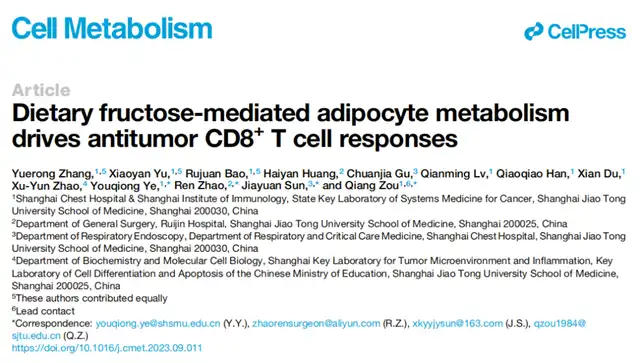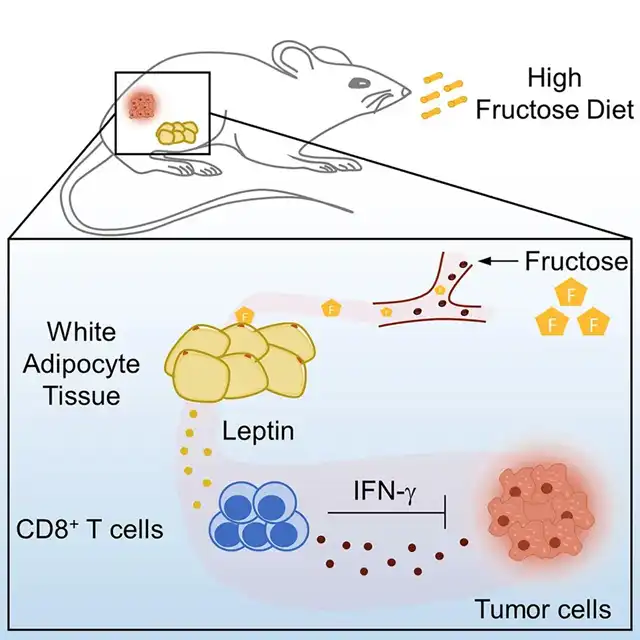High-Fructose Diet Promotes Anti-Tumor Effects
- Normal Liver Cells Found to Promote Cancer Metastasis to the Liver
- Nearly 80% Complete Remission: Breakthrough in ADC Anti-Tumor Treatment
- Vaccination Against Common Diseases May Prevent Dementia!
- New Alzheimer’s Disease (AD) Diagnosis and Staging Criteria
- Breakthrough in Alzheimer’s Disease: New Nasal Spray Halts Cognitive Decline by Targeting Toxic Protein
- Can the Tap Water at the Paris Olympics be Drunk Directly?
High-Fructose Diet Promotes Anti-Tumor Effects
- Should China be held legally responsible for the US’s $18 trillion COVID losses?
- CT Radiation Exposure Linked to Blood Cancer in Children and Adolescents
- FDA has mandated a top-level black box warning for all marketed CAR-T therapies
- Can people with high blood pressure eat peanuts?
- What is the difference between dopamine and dobutamine?
- How long can the patient live after heart stent surgery?
High-Fructose Diet Promotes Anti-Tumor Effects
Fructose, a monosaccharide and an isomer of glucose, ranks as the second most abundant sugar in our diet after glucose. Known for its pleasant taste, high sweetness, and low glycemic index, fructose is widely incorporated into beverages and foods to enhance flavor. For instance, the sugar frequently added to drinks like bubble tea is predominantly fructose-glucose syrup (composed mainly of fructose).
Increasing evidence suggests a connection between fructose consumption and cancer incidence. Studies have shown that high fructose intake promotes the development of liver and colon cancer in mice. However, the National Institutes of Health-American Association of Retired Persons (NIH-AARP) Diet and Health Study indicates a protective effect of fructose against lung cancer.
These seemingly contradictory findings may be attributed to differences in the tumor microenvironment (TME). Nonetheless, the impact of dietary fructose on the molecular, metabolic, and immunological characteristics of TME remains uncertain. Innate and adaptive immune cells within TME possess both pro-tumor and anti-tumor functions. CD8+ T cells, as essential components of the adaptive immune system, exert anti-tumor functions by directly killing tumor cells or inducing other immune cells to respond against tumors. However, tumor-infiltrating CD8+ T cells often exhibit progressive loss of proliferation and effector functions, leading to immune evasion by cancer cells.
Targeting inhibitory molecules such as PD-1, CTLA-4, and TIM-3 can reactivate the anti-tumor activity of CD8+ T cells within tumors, effectively treating various cancer types. Yet, the impact of dietary fructose on innate and adaptive anti-tumor immune responses remains unclear.
On October 19, 2023, researchers from Shanghai Jiao Tong University School of Medicine published a study titled “Dietary fructose-mediated adipocyte metabolism drives antitumor CD8+ T cell responses” in the journal Cell Metabolism.
This research uncovers that dietary fructose-mediated adipocyte metabolism drives anti-tumor CD8+ T cell responses, suggesting that the fructose-leptin axis might be applicable in cancer immunotherapy.

Fructose intake has been associated with mouse tumor growth and metastasis, but its influence on anti-tumor immune responses remains uncertain. In this study, the research team found that feeding mice a high-fructose diet improves the responses of anti-tumor CD8+ T cells and slows down tumor growth. Transcriptome analysis of tumor-infiltrating CD8+ T cells revealed that dietary fructose mediated a reduction in the exhaustion of CD8+ T cells, resulting in superior anti-tumor efficacy.
Fructose consumption triggers the production of mTORC1-dependent leptin in fat cells, leading to increased levels of leptin in serum and tumor tissue, which is a crucial element in observed enhanced anti-tumor immunity. Importantly, high leptin levels in the plasma are associated with increased anti-tumor activity of CD8+ T cells in lung cancer patients.
Our findings reveal the existence of a fructose-adipocyte leptin-CD8+ T cell axis as an endocrine pathway that contributes to T cell-mediated anti-tumor immunity. This extends our understanding of the molecular mechanisms underlying the regulation of anti-tumor immune responses by dietary fructose.

In summary, this study suggests that dietary fructose plays a significant role in guiding fat cell metabolism, promoting CD8+ T cell immune responses, and controlling tumor growth. These findings raise the possibility that the fructose-leptin axis could be utilized in cancer immunotherapy.
Doctoral student Zhang Yuerong, Associate Professor Yu Xiaoyan, and Technician Bao Rujuan from the Shanghai Institute of Immunology, Shanghai Jiao Tong University School of Medicine, are the co-first authors of this paper. Professors Zou Qiang, Sun Jiayuan, Zhao Ren, and Ye Youqiong from Shanghai Jiao Tong University School of Medicine are the corresponding authors of this paper.
High-Fructose Diet Promotes Anti-Tumor Effects
Paper Link:
https://doi.org/10.1016/j.cmet.2023.09.011
(source:internet, reference only)
Disclaimer of medicaltrend.org
Important Note: The information provided is for informational purposes only and should not be considered as medical advice.



